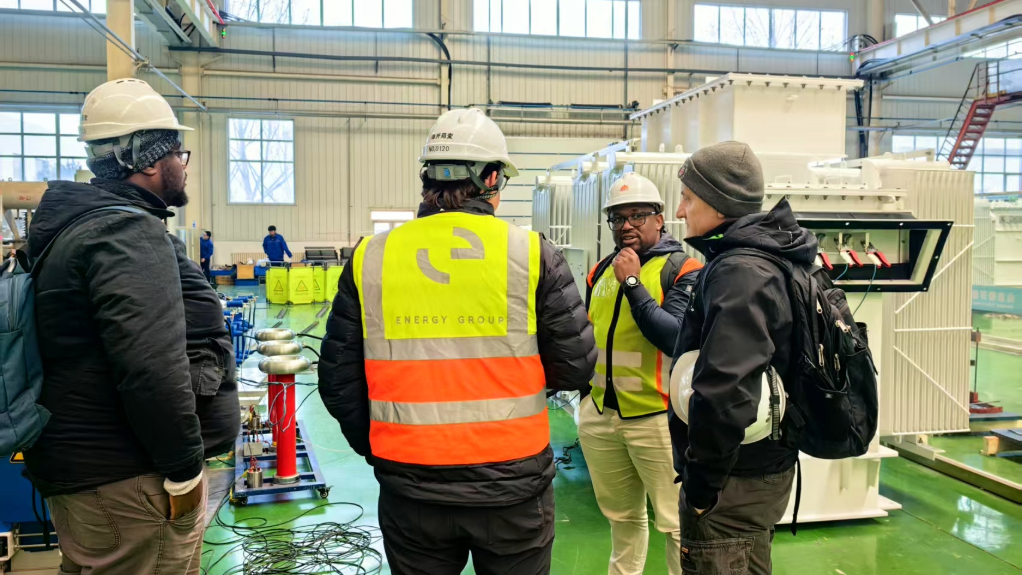BESS key to stabilising grid



BEST PRACTICES Energy Group is adapting best practices and engaging with stakeholders to lay the groundwork for their future deployment
JASON FAIRHURST Energy Group’s BESS offerings are aimed at providing energy arbitrage, optimised renewable integration
Industrial clean energy projects specialist Energy Group is focusing on the development of battery energy storage system (BESS) solutions to address grid instability and arbitrage opportunities in South Africa.
With increasing pressure on the national grid, owing to frequent loadshedding and the growing integration of renewable energy, BESS is seen as a crucial component in stabilising the grid, says Energy Group senior manager Jason Fairhurst.
Energy Group’s BESS offerings are aimed at providing energy arbitrage, optimised renewable integration, peak shaving and grid support.
This approach is designed to optimise energy use by charging batteries when electricity is abundant and affordable and discharging when demand spikes and energy prices are at a maximum.
“South Africa’s grid is under pressure, and as more renewable energy is added, it’s essential to manage the timing of energy dispatch to ensure stability and optimal use,” Fairhurst tells Engineering News.
He explains that Energy Group’s BESS solutions offer large energy users an opportunity to cut costs by charging during off-peak periods when electricity tariffs are lower and discharging during peak demand times. In so doing, businesses can reduce electricity costs while also supporting the grid.
He notes that this has not always been economically feasible, but owing to massive reductions of almost 50% year-on-year in BESS technology costs for the past two years, increases in electricity costs and the widening of the gap between off-peak and peak energy prices, it has all changed.
“The writing is pretty much on the wall in my view. We can look to other more advanced energy markets like the US, Europe and China to see where it is going, where the rapid large-scale rollout of renewable power coupled with large-scale BESS allows for a resilient, reliable and sustainable electrical future,” Fairhurst says.
Current solutions offered include compact 5 MWh BESS units housed within 20-foot containers, storing enough energy to power a typical home for about 200 days on a single charge. Installation of these systems is straightforward, requiring minimal space and minimal civil engineering work.
BESS also supports renewable energy by unlocking additional capacity and storing any potentially unused or curtailed energy.
“With renewable sources such as solar and wind fluctuating, BESS ensures energy availability when it’s most needed, enhancing reliability and providing critical backup during loadshedding, thus reducing dependence on expensive diesel generators,” he notes.
In addition to energy arbitrage, the company’s BESS solutions can support grid stability by responding to frequency fluctuations, shifting loads and smoothing the output of renewable-energy sources such as solar and wind.
Considering that State-owned power utility Eskom’s Retail Tariff Plan has been approved by the National Energy Regulator of South Africa, effectively changing the rules and the way electricity tariffs are structured and incentivised, Fairhurst says that, with BESS coupled to a system, a user can modify their demand profile overnight, which provides flexibility and risk cover.
“BESS technology can provide rapid energy injections to stabilise frequency fluctuations and support the grid when it is under strain. BESS systems can help [with] grid restarts during major outages, offering a level of resilience that is important for South Africa. This feature is a key step towards supporting a cleaner, more stable energy future,” Fairhurst explains.
Further, although virtual power plants (VPPs) are still in their early stages in South Africa, Energy Group is actively exploring their potential.
“VPPs are something we are excited about. We’re adapting best practices from global markets and engaging with stakeholders to lay the groundwork for their future deployment,” says Fairhurst.
However, several barriers to large-scale BESS adoption remain, including regulatory uncertainty, high capital costs and grid connection challenges.
Energy Group is addressing these issues through innovative financing models and policy engagement aimed at accelerating adoption.
The company is also working with regulators to clarify policies and create revenue models for grid services, while simultaneously actively seeking ways to streamline those processes.
“The era of large-scale batteries is here, and this is a critical component to unlocking firm, sustainable and renewable energy, which brings with it great economic opportunity for all energy users,” Fairhurst concludes.
Article Enquiry
Email Article
Save Article
Feedback
To advertise email advertising@creamermedia.co.za or click here
Press Office
Announcements
What's On
Subscribe to improve your user experience...
Option 1 (equivalent of R125 a month):
Receive a weekly copy of Creamer Media's Engineering News & Mining Weekly magazine
(print copy for those in South Africa and e-magazine for those outside of South Africa)
Receive daily email newsletters
Access to full search results
Access archive of magazine back copies
Access to Projects in Progress
Access to ONE Research Report of your choice in PDF format
Option 2 (equivalent of R375 a month):
All benefits from Option 1
PLUS
Access to Creamer Media's Research Channel Africa for ALL Research Reports, in PDF format, on various industrial and mining sectors
including Electricity; Water; Energy Transition; Hydrogen; Roads, Rail and Ports; Coal; Gold; Platinum; Battery Metals; etc.
Already a subscriber?
Forgotten your password?
Receive weekly copy of Creamer Media's Engineering News & Mining Weekly magazine (print copy for those in South Africa and e-magazine for those outside of South Africa)
➕
Recieve daily email newsletters
➕
Access to full search results
➕
Access archive of magazine back copies
➕
Access to Projects in Progress
➕
Access to ONE Research Report of your choice in PDF format
RESEARCH CHANNEL AFRICA
R4500 (equivalent of R375 a month)
SUBSCRIBEAll benefits from Option 1
➕
Access to Creamer Media's Research Channel Africa for ALL Research Reports on various industrial and mining sectors, in PDF format, including on:
Electricity
➕
Water
➕
Energy Transition
➕
Hydrogen
➕
Roads, Rail and Ports
➕
Coal
➕
Gold
➕
Platinum
➕
Battery Metals
➕
etc.
Receive all benefits from Option 1 or Option 2 delivered to numerous people at your company
➕
Multiple User names and Passwords for simultaneous log-ins
➕
Intranet integration access to all in your organisation



















